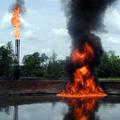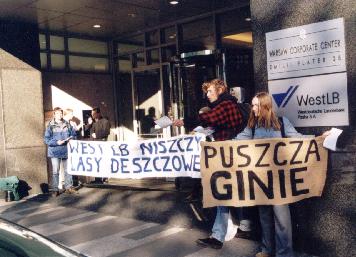
last update:
Warsaw, June 12, 2003 10:00
english po polsku

WestLB office in Warsaw 10/24/2001
 last update: Warsaw, June 12, 2003 10:00 | english po polsku |  WestLB office in Warsaw 10/24/2001 |
|
Thursday October 25 01:39 PM EDT
Global Protests Against Ecuador Pipeline
By Jim Lobe, OneWorld US
WASHINGTON, Oct 25 - Scores of demonstrators turned out in more than a dozen capitals across Europe and in the United States and Australia Wednesday to protest the involvement of Germany's largest publicly held bank in a controversial oil pipeline project in the Ecuador's Amazon region. Supporters and representatives of indigenous groups which actively oppose the project also marched before the German Embassy in Quito, Ecuador, to press WestLB--the lead bank in a consortium of lenders which is providing nearly US$900 million in financing for the 300-mile Oleoducto de Crudo Pesado (Crude Oil Pipeline), or OCP--to pull out of the project. The proposed OCP will stretch from the Ecuadorian Amazon to the Pacific Ocean, passing through several indigenous territories as well as ecologically fragile protected areas, such as the Mindo Nambillo Cloudforest Reserve, one of the world's premier bird sanctuaries. "The pipeline affects 11 protected areas and is a threat to endangered species and critical rainforest ecosystems of global significance," said Kevin Koenig, a campaigner for Amazon Watch, a California-based group which co-sponsored this week's demonstrations. The government of Ecuadorian President Gustavo Noboa has defended the $US1.1 billion project as essential to jump-start the country's long-troubled economy. Ecuador's oil production, which has lagged in recent years, will double once the crude starts flowing through the OCP to the country's Pacific ports. But critics argue that the costs to Ecuador's indigenous cultures and unique ecologies will be too great. Pipeline spills would risk despoiling potential eco-tourism spots and construction of the pipeline itself will likely draw settlers who may clash with the indigenous groups and exert unsustainable pressures on the fragile rainforest ecologies, according to the critics. But Noboa and the chief investors in the project--Canada's Alberta Energy, Spain's Repsol-YPF, and U.S. companies Occidental Petroleum and Kerr-McGee--have vowed to go forward with it. "The pipeline will be built, and that is final," Noboa said last May, after his own environment minister criticized it. "I am not going to let them mess things up for the country [just because of] a handful of idiots." WestLB's status as a publicly held bank--the government of North Rhine Westphalia owns a 42 percent share--has spurred debate about whether it should be involved in a project which is potentially damaging. Green Party members in the state parliament and even the state's environment minister, Baerbel Hoehn, have spoken out against the bank's participation. The bank's consortium partners -- notably J.P. Morgan Chase, Citigroup, and Deutsche Bank -- have also come under pressure from northern-based groups. In a letter sent to each of them last May, a coalition which included Amazon Watch, Oxfam America, Greenpeace International, Friends of the Earth (news - web sites), and Rainforest Action Network, called on the banks to withhold loans until a comprehensive and independent international review of the environmental and social impacts of the project could be carried out. Indigenous groups, including the Indigenous Nationalities Confederation of Ecuador (CONAIE) have brought lawsuits against the project. Last week, dozens of protestors mounted peaceful blockades to stop construction. Wednesday's international protests, which were held in San Francisco, Washington, London, Munich, Zurich, Warsaw, and Sydney, among other cities, were carried out in solidarity with them. |